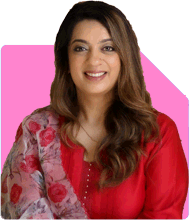Anu Krishna |1745 Answers |Ask -Follow
Relationships Expert, Mind Coach - Answered on Feb 12, 2024
The co-founder of Unfear Changemakers LLP, she has received her neuro linguistic programming training from National Federation of NeuroLinguistic Programming, USA, and her energy work specialisation from the Institute for Inner Studies, Manila.
She is an executive member of the Indian Association of Adolescent Health.... more

Hi mam, my wife is adultery with others. I know it long back before 10 years. infact she opened up and continuing for long time. As fun it started, and i being part of it making flame. It is just beyond body, now they emotional bonding and appreciation is what she looks from other side. she 46+ and other one is in age of 53. Three years we were out of india and now back to place the relationship can continue. I am sure even if i am not agreeing she will continue to do so as part of emotional support and physical need. What is right for real long standing relationship ?
Since you knew about it earlier and did not express any discomfort, things moved in a particular way...Now, you feel uncomfortable about it all, she has gotten used to things being a particular way.
If you are keen on a long-term relationship with your wife, then all you have to do is reconnect with your wife at an emotional level. Things have gone too far and she may or may not come back into the marriage; but you can give it an honest attempt...Women seek a lot of emotional bonding within a marriage or any relationship and that can be the key to saving yours.
All the best!
You may like to see similar questions and answers below
Anu Krishna |1745 Answers |Ask -Follow
Relationships Expert, Mind Coach - Answered on Aug 12, 2021
Pooja Khera | Answer |Ask -Follow
Life, Relationship Coach - Answered on Feb 17, 2023
Anu Krishna |1745 Answers |Ask -Follow
Relationships Expert, Mind Coach - Answered on Dec 12, 2023
Anu Krishna |1745 Answers |Ask -Follow
Relationships Expert, Mind Coach - Answered on Nov 07, 2024
Radheshyam Zanwar |6735 Answers |Ask -Follow
MHT-CET, IIT-JEE, NEET-UG Expert - Answered on Dec 06, 2025
Dr Nagarajan J S K |2576 Answers |Ask -Follow
NEET, Medical, Pharmacy Careers - Answered on Dec 06, 2025
Mihir Tanna |1090 Answers |Ask -Follow
Tax Expert - Answered on Dec 06, 2025
Ramalingam Kalirajan |10872 Answers |Ask -Follow
Mutual Funds, Financial Planning Expert - Answered on Dec 06, 2025
Radheshyam Zanwar |6735 Answers |Ask -Follow
MHT-CET, IIT-JEE, NEET-UG Expert - Answered on Dec 06, 2025
Radheshyam Zanwar |6735 Answers |Ask -Follow
MHT-CET, IIT-JEE, NEET-UG Expert - Answered on Dec 06, 2025
Radheshyam Zanwar |6735 Answers |Ask -Follow
MHT-CET, IIT-JEE, NEET-UG Expert - Answered on Dec 06, 2025
Dr Dipankar Dutta |1837 Answers |Ask -Follow
Tech Careers and Skill Development Expert - Answered on Dec 05, 2025
Dr Shyam Jamalabad |108 Answers |Ask -Follow
Dentist - Answered on Dec 05, 2025
Dr Shyam Jamalabad |108 Answers |Ask -Follow
Dentist - Answered on Dec 05, 2025






























